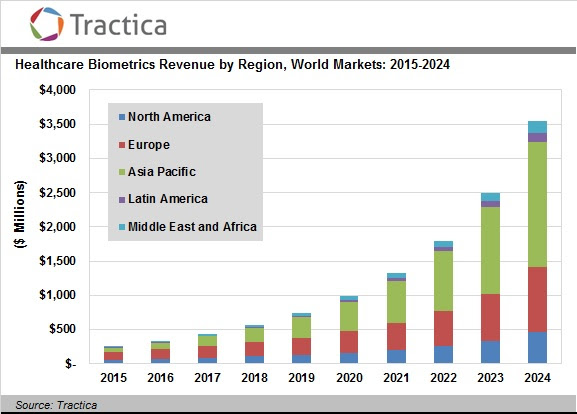 As more and more mobile devices embed biometric sensors, mostly for health and fitness tracking, the market for using biometrics for identifying and authenticating people is trending up, according to a recent report from analyst firm Tractica. The group also points to the healthcare industry as one of the most promising sectors for adoption of biometric authentication. Tractica believes that biometrics can help healthcare providers speed up administrative processes, reduce fraud, and help eliminate mistakes stemming from providers' demanding workloads.
As more and more mobile devices embed biometric sensors, mostly for health and fitness tracking, the market for using biometrics for identifying and authenticating people is trending up, according to a recent report from analyst firm Tractica. The group also points to the healthcare industry as one of the most promising sectors for adoption of biometric authentication. Tractica believes that biometrics can help healthcare providers speed up administrative processes, reduce fraud, and help eliminate mistakes stemming from providers' demanding workloads.
“The outlook is strong for healthcare biometrics, however it remains a nascent market,” Tractica's principal analyst Bob Lockhart said in a statement. “Success stories are scarce. Even large healthcare networks are barely dipping their toes into the water, with early proofs of concept.”
While the global market for biometric authentication in healthcare is likely to hit just $250 million this year, the firm expects it to reach $3.5 billion by 2024. Its set to generate $12.5 billion in revenues between now and then, Tractica estimates.
In May Tractica discussed a report that pegged the total global market for biometric authentication at $14.9 billion in 2024. That means the global healthcare industry is set to make up north of 23 percent of the overall market at that time.
Home or remote patient access, care provider authentication, patient identification and tracking, and pharmacy dispensing will be the healthcare use cases that drive the market, the firm writes.














